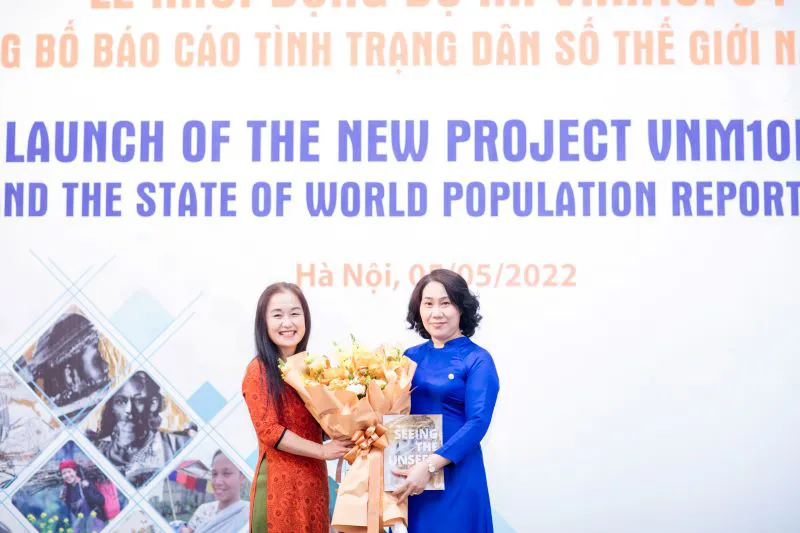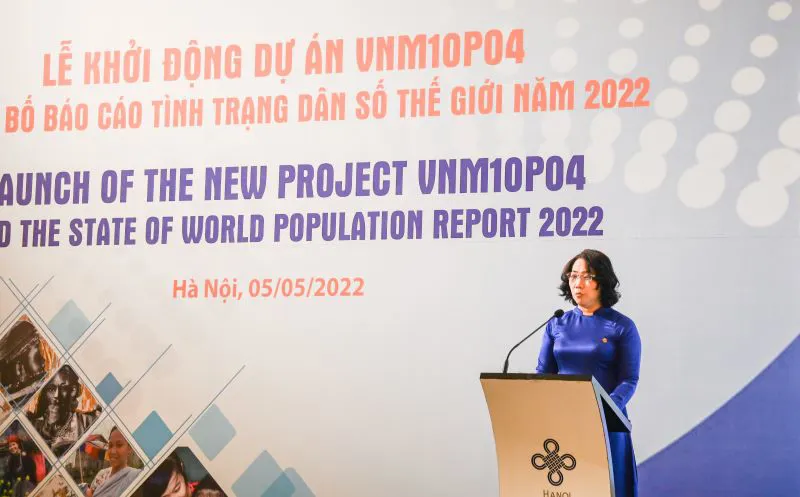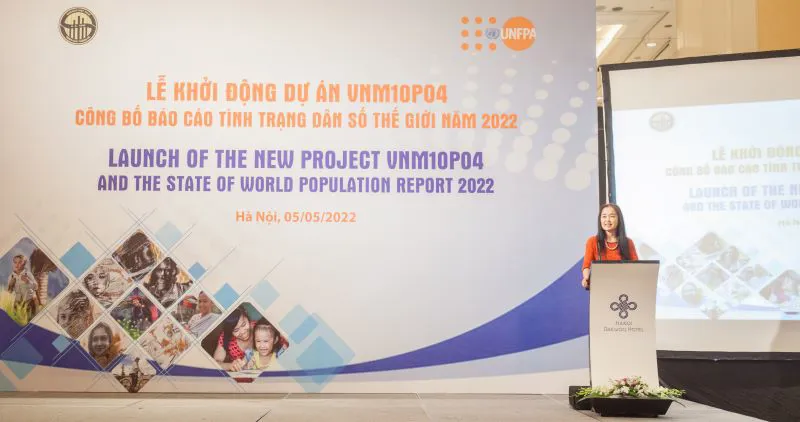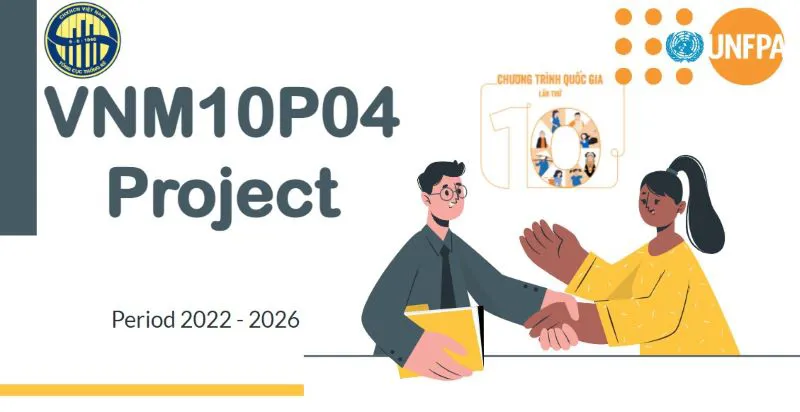UNFPA supports Vietnam for better policy making in population
Data collection is regarded as an important factor in evidence-based policies for the achievement of Sustainable Development Goals in Vietnam.
The United Nations Population Fund (UNFPA) and the General Statistics Office (GSO) of Vietnam on May 5 launched a new project to support Vietnam in generating and utilizing quality population and development data in a project worth US$1.9 million.
| United Nations Population Fund (UNFPA) Representative in Vietnam Naomi Kitahara (L) and Director General of the General Statistics Office (GSO) of Vietnam Nguyen Thi Huong at the launch of new project held in Hanoi on May 5. Photos: UNFPA |
The project titled VNM10P04 for 2022-2026 will help Vietnam in applying new technologies and communication platforms to the data collection, analysis, and dissemination, ensuring evidence-based policies, strategies, and programs for the achievement of Sustainable Development Goals (SDGs) by 2030.
The project matters a lot to Vietnam in the midst of rapid transformation for its socio-economic growth with the implementation of the Socio-economic Development Strategy (SEDS) 2021-2030 and the Socio-economic Development Plan (SEDP) 2021-2025, according to experts.
It becomes more meaningful in a context in which the Covid-19 pandemic has taken a heavy toll on Vietnam’s socio-economic development and on population shifts with regard to mortality, fertility, and migration. Therefore, reliable and quality statistics are fundamental to formulate, implement, monitor and assess the country’s progress in achieving socio-economic and SDGs targets.
Addressing the event, GSO Director General Nguyen Thi Huong expressed: “The project, which is part of the 10th Country Program between the General Statistics Office and UNFPA, is in line with the Vietnam Statistical Development Strategy’s implementation roadmap for 2021-2030, with a vision until 2045.”
The partnership with UNFPA in 2022-2026 for applying advanced technologies in collecting, analyzing, publishing, and archiving population and social data aims to serve the policy making and planning of socio-economic goals as well as supervising SDGs for the 2021-2030 period, Huong shared with The Hanoi Times.
In a broader prospect, the partnership is in line with the Vietnam Statistical Development Strategy’s implementation roadmap for 2021-2030, with a vision until 2045, she said, adding that GSO will effectively conduct the project by providing timely and high-quality data for policy making, contributing to the country’s socio-economic development and boosting national growth.
GSO’s capacity in the generation and management of data and statistics has significantly improved largely thanks to the cooperation between Vietnam and UNFPA over the past 45 years, she noted.
| Director General of the General Statistics Office (GSO) of Vietnam Nguyen Thi Huong speaks at the event. |
“As we always say, countries with quality data are the ones which achieve impressive socio-economic growth. Better Data, Better Lives,” UNFPA Representative in Vietnam Naomi Kitahara said at the launch. “We are now entering into the new 10th country program and GSO is one of the most important partners for UNFPA Vietnam.”
“Vietnam has been progressing very fast in achieving Sustainable Development Goals. It becomes very important to understand more about data in making decisions in the national planning. It becomes a decisive factor in implementing the development targets, especially in the context that Covid-19 has left heavy impact on Vietnam and other countries in the world,” Kitahara told The Hanoi Times.
This new project, which includes the majority is non-refundable from the UN body and the country’s reciprocal party, will focus on improving capacity of data producers to collect, analyze and disseminate disaggregated data on population and sexual and reproductive health issues; equipping policy makers with knowledge and skills on application of new data; exploring new data set and data communication and management to support evidence-based population policy development, which can also be used for disaster management and climate action; developing capacities for data utilization for evidence-based advocacy and policy development; preparing investment cases for sexual and reproductive health and rights (SRHR).
| UNFPA Representative in Vietnam Naomi Kitahara delivers speech at the event. |
Vietnam under pressure of unintended pregnancy
At the event, UNFPA also presented Vietnam key findings from its flagship report “The State of the World Population”. This year’s report titled “Seeing the Unseen: The case for action in the neglected crisis of unintended pregnancy” explains that nearly half of all pregnancies in the world, totaling 121 million each year, are unintended. For women and girls affected, the most life-altering reproductive choice – whether or not to become pregnant – is no choice at all.
The report warns that this human rights crisis has profound consequences for societies, women and girls, and global health, including those in Vietnam.
Vietnam has made significant progress in improving sexual and reproductive health in the past 20 years. However, disparities and inequalities remain in sexual and reproductive health among different population groups including ethnic minorities, migrant workers, young people, and those living in remote locations.
Current evidence shows that while the maternal mortality ratio has declined to 46 maternal deaths per 100,000 live births at the national level in Vietnam, it is still 2-3 times higher particularly in Northern midland and mountainous areas, and Central Highlands. Also, maternal mortality is 7 times higher among Hmong mothers than the Kinh mothers. In those locations, a lot of mothers are dying from pregnancy and childbirth still at home, and many are not attended by skilled birth attendants.
The SDGs survey conducted by Vietnam’s General Statistics Office in 2021 in collaboration with UNFPA and UNICEF showed that only 72.2% of married women are satisfied with modern contraceptives, and this percentage even drops further to 50.3% for unmarried women. The problem seems to be acute among unmarried people, whose unmet need for family planning is estimated 4 times higher than married women.
Kitahara shared that the situation in Vietnam has left pressure on women’s education and employment, as well as pressure on society, calling unintended pregnancy “an unseen crisis.”
“UNFPA is calling on policymakers and community leaders to prioritize women’s and girls’ rights, expand their choices including universal access to safe and effective contraceptives and make sure that every young person – yes, boys too – is fully aware of the risks of and means of avoiding unintended pregnancies,” she emphasized.
We need to listen to the voices of women, better understand their needs, and echo their calls for equality in every sphere, Kitahara expressed concerns.
| A new project between UNFPA and GSO for the 2022-2026 period. |















